Key takeaways:
- Understanding classic car values involves considering rarity, condition, and provenance, which can significantly impact pricing.
- Preparing for auctions through market research, setting a budget, and attending pre-auction viewings is essential for making informed decisions.
- First-time buyers should observe the auction process, research beforehand, and build a network with experienced collectors for guidance.
- Patience, emotional detachment, and adapting to the auction’s unique pace are crucial strategies for successful bidding.
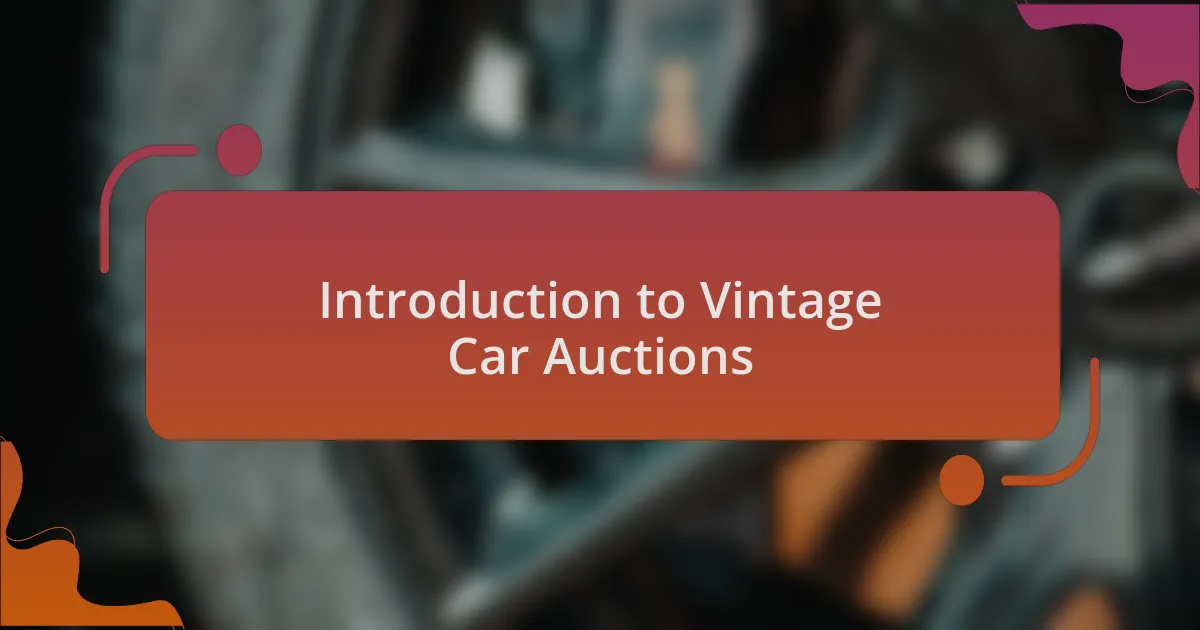
Introduction to Vintage Car Auctions
Attending vintage car auctions is like stepping into a time machine, where every vehicle whispers stories of the past. I remember my heart racing as I entered the auction hall, surrounded by gleaming beauties that were more than just cars; they were pieces of history, each with its own unique tale. Have you ever felt the thrill of anticipation as a classic car rolls onto the stage, capturing the attention of passionate enthusiasts?
The atmosphere at these events is electric, charged with the energy of collectors, dealers, and admirers all drawn together by a shared love for timeless automobiles. I still vividly recall the moment the bidding started for a rare 1967 Mustang—it felt as if everyone held their breath, caught in the urgency of wanting to reclaim a slice of nostalgia. Isn’t it fascinating how a single vintage car can ignite such strong emotions and fierce competition among bidders?
Beyond the excitement, vintage car auctions also serve as a valuable platform for learning, revealing market trends and showcasing the significance of various models. Each auction presents an opportunity to connect with fellow aficionados, share insights, and gain a deeper appreciation for automotive craftsmanship. Looking back, I find that my experiences at these auctions have not only expanded my collection but enriched my understanding of the automotive world.
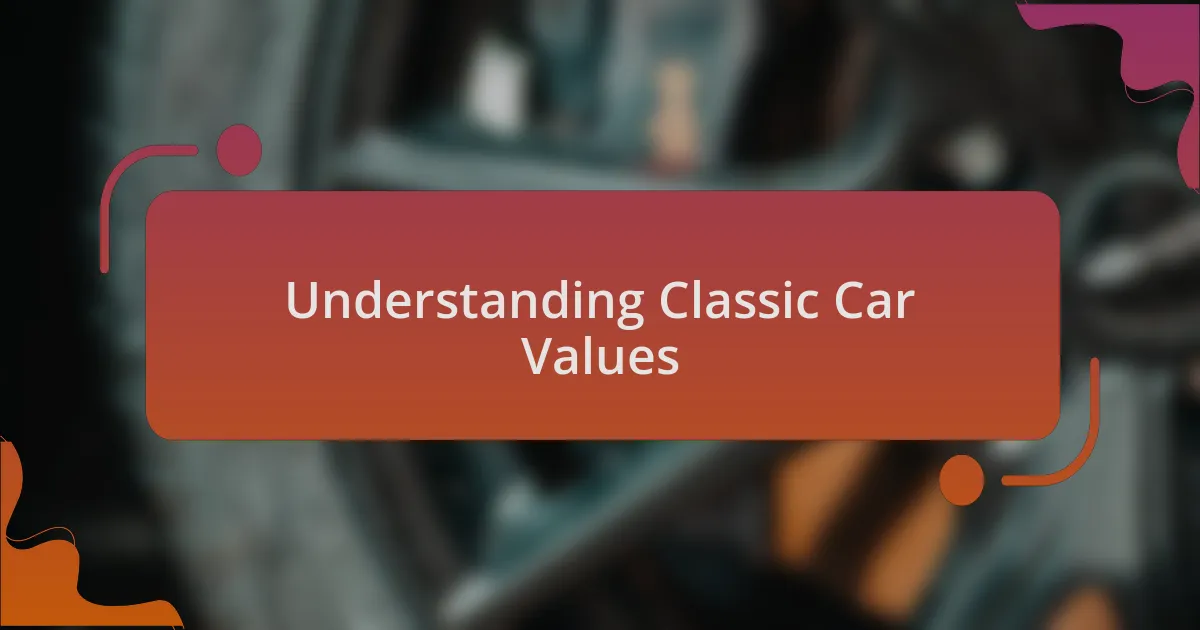
Understanding Classic Car Values
When it comes to understanding classic car values, I’ve learned that rarity and condition play crucial roles. I once came across a beautifully preserved 1950s Jaguar XK140, and the moment I laid eyes on it, I could tell it was special. Its limited production numbers and pristine state meant it wasn’t just a car; it was an investment waiting to be claimed.
Another factor to consider is provenance. I still reflect on the time I drove away from an auction with a 1969 Chevrolet Camaro that had a remarkable history, including a famous race pedigree. The story behind that car added a layer of value that a simple restoration couldn’t match. Have you ever wondered how much more a classic car could be worth if it once belonged to a celebrity?
It’s also interesting to note how market trends can influence prices. I witnessed a surge in interest for muscle cars recently, which drove up auction prices significantly. It made me think about how the ebb and flow of popular culture can reshape the classic car landscape. Recognizing these shifts can empower potential buyers to make informed decisions and perhaps snag a great deal at their next auction.
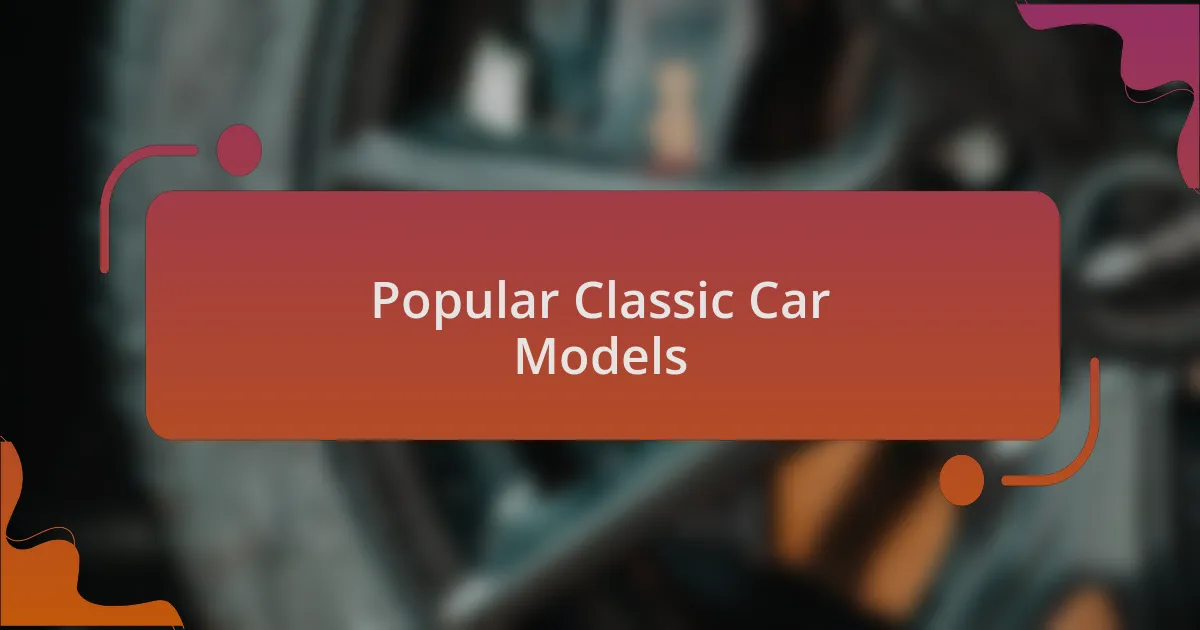
Popular Classic Car Models
One classic car that never fails to capture attention is the Ford Mustang, especially the models from the late 1960s. I remember attending an auction where a 1967 Mustang Fastback stole the show, its vibrant red paint gleaming under the lights. It’s fascinating how this car has become an iconic representation of American muscle, connecting to so many people’s youthful nostalgia—what’s more thrilling than the roar of a Mustang’s engine echoing down a winding road?
Another crowd favorite is the Porsche 911, a timeless beauty that I’ve often admired. I had the chance to ride in a 1973 model, and the experience was unforgettable—the way it handles, the design, and that unmistakable sound! The emotional connection it creates is undeniable; it feels like more than just a car—it’s a piece of automotive art that evokes a sense of adventure. How many other cars can stir such passion and loyalty among enthusiasts?
Then there’s the Chevrolet Corvette, an enduring symbol of speed and sophistication. I once saw a stunning 1963 Split-Window Coupe that left me mesmerized. The unique design and performance capabilities have transformed this car into a culture of its own. Why do you think the Corvette has maintained such a devoted following over the decades? It’s clear to me that its blend of innovation and style speaks to both collectors and casual fans alike, making it a staple at any classic car auction.
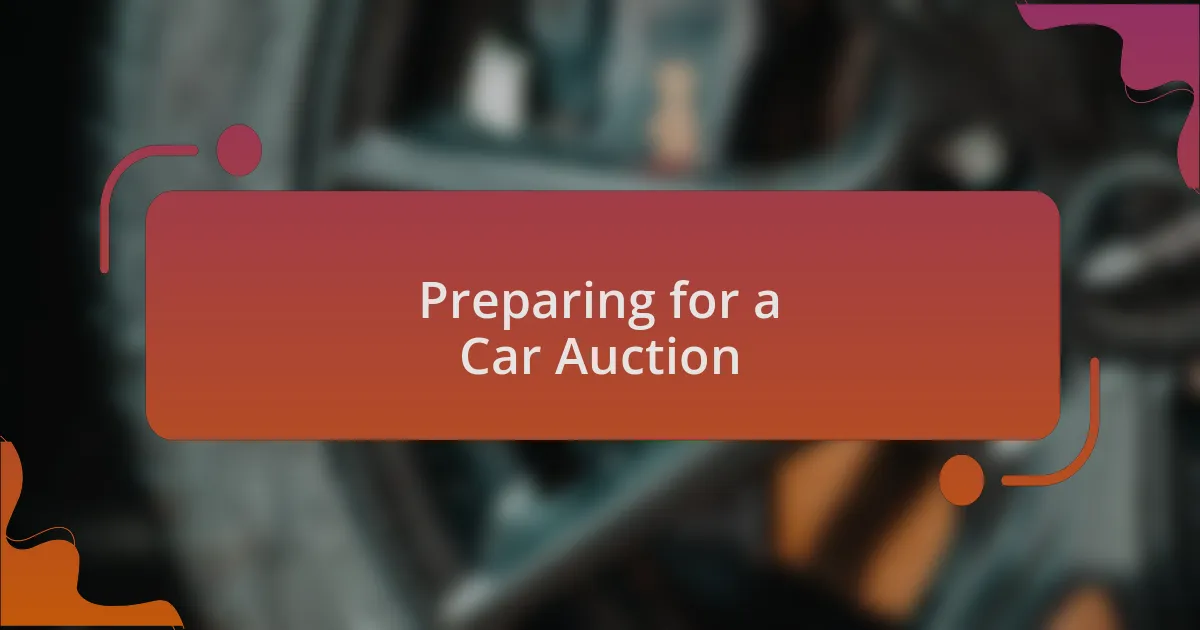
Preparing for a Car Auction
Preparing for a car auction requires careful planning and a keen understanding of the market. I recall my first auction experience; walking in, I felt a mix of excitement and anxiety. Knowing the estimated values of various models helped me spot hidden gems and avoid overbidding. It’s crucial to do your homework—what are the current trends? Which cars draw the most attention?
Another important aspect is to establish a clear budget before you step inside the auction hall. I learned this lesson the hard way when I got caught up in the bidding frenzy for a 1965 Mustang. Emotions can cloud your judgment, making it easy to overspend. By setting a firm limit, you can stay focused and ensure you’re making a sound investment rather than an impulsive decision.
Additionally, attending pre-auction viewings is invaluable. It gives you a chance to closely inspect the vehicles and ask questions. I remember the first time I laid eyes on a pristine 1970 Chevrolet Chevelle SS—heart racing as I examined the engine and interior. This first-hand experience can offer insights that photos or descriptions simply cannot convey. Have you ever experienced that electric feeling of connecting with a classic car in person? It’s irreplaceable and can greatly influence your auction strategy.
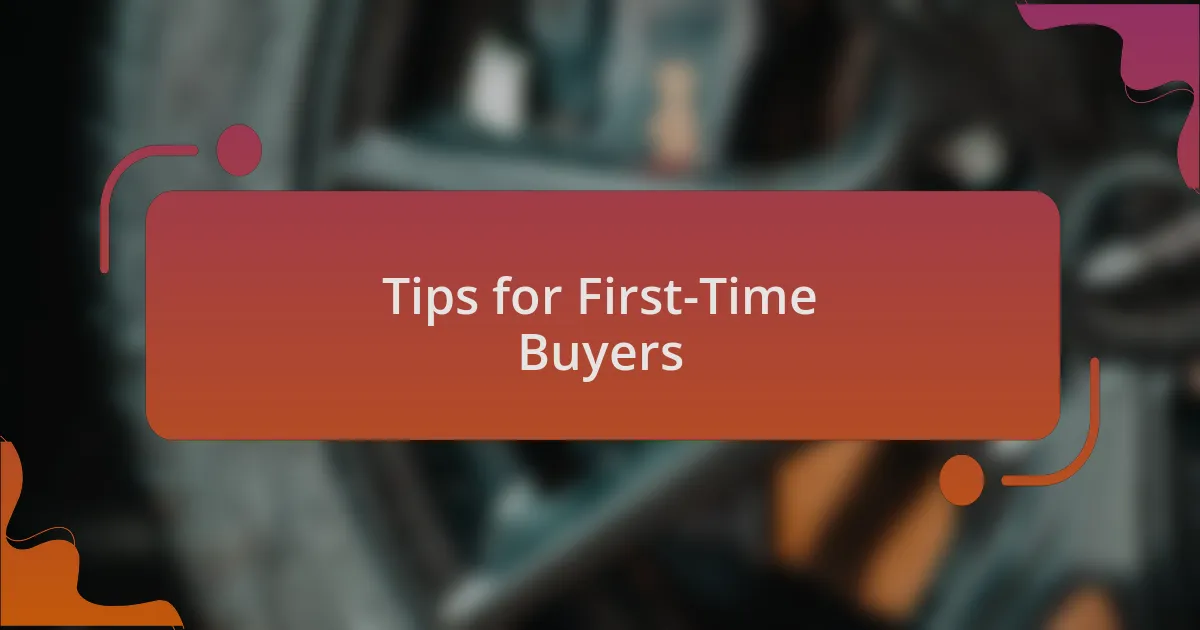
Tips for First-Time Buyers
When it comes to attending a classic car auction for the first time, understanding the auction process is key. I vividly remember how I felt completely overwhelmed by the rapid bidding. It helped me to sit and watch a few lots before my turn to bid, soaking in the atmosphere and observing how experienced bidders interacted. If I could pass on one piece of advice, it would be to take that initial time to simply absorb the experience. It’s like getting a backstage pass to the thrilling world of classic cars.
Don’t underestimate the importance of researching the cars beforehand. I once came across a stunning Jaguar XK150 that caught my eye, but because I hadn’t prepped well, I didn’t know its historical value. The difference between knowing specifics and going in blind can impact your ability to make competitive bids. I can’t stress this enough: know what you’re buying! How do you expect to find the right classic car if you don’t know what to look for?
Lastly, the power of networking shouldn’t be overlooked in this space. I struck up a conversation with a seasoned collector during my first auction, and it turned into a mentoring relationship. It’s amazing how many tips and insights you can gain from simply chatting with others who share your passion. Why not reach out at the auction or follow up with contacts later? You might just uncover a wealth of knowledge while building lasting relationships.
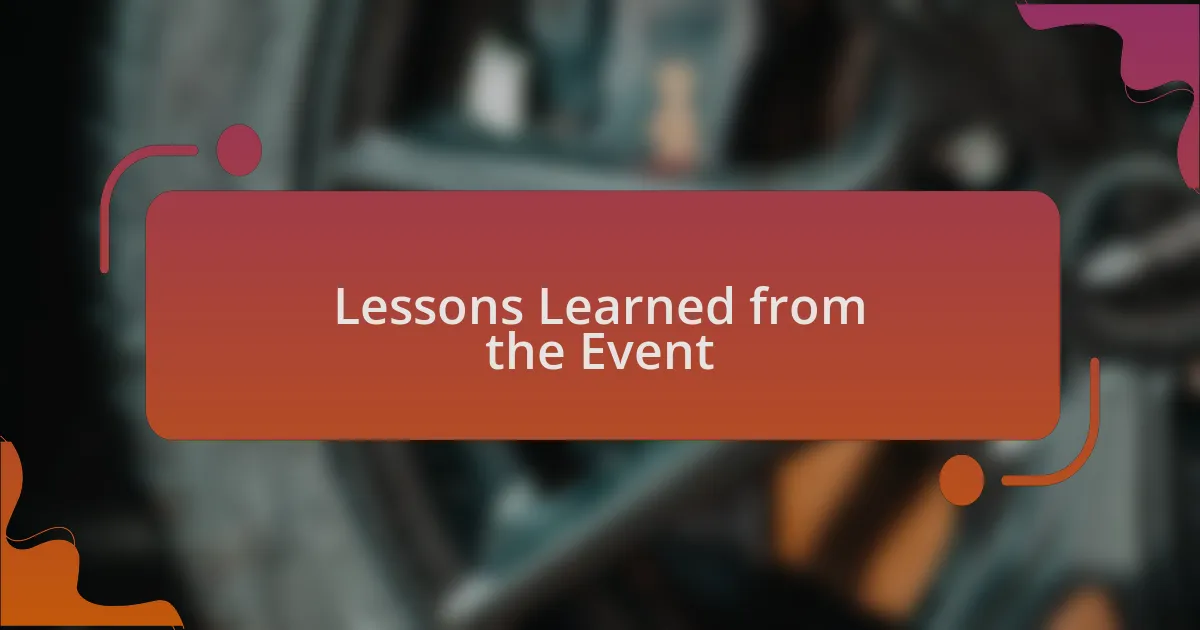
Lessons Learned from the Event
While attending my first classic car auction, I learned that patience truly pays off. I witnessed a bidding war for a beautifully restored Mustang; the excitement in the room was palpable. In that moment, I realized that waiting for the right moment to bid, instead of jumping in impulsively, can lead to better outcomes. Has anyone else experienced that tension between excitement and strategy?
Another lesson was the importance of emotional detachment. I once became infatuated with a vintage Corvette, letting my passion overshadow my reasoning during the bid. The heart may crave a beautiful machine, but my past mistakes taught me to keep a level head and assess my budget realistically. Have you ever let an emotional attachment cloud your judgment in a similar situation?
Finally, I learned that every auction has its unique rhythm. One auction I attended was fast-paced and chaotic, while another felt much more relaxed, allowing for thoughtful bidding. Each environment demands a different approach, and adapting to this can be the difference between walking away with your dream car or going home empty-handed. Isn’t it fascinating how each experience shapes our knowledge for the next?